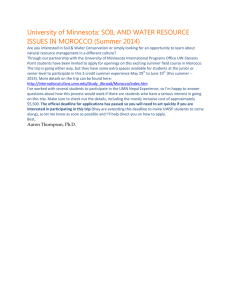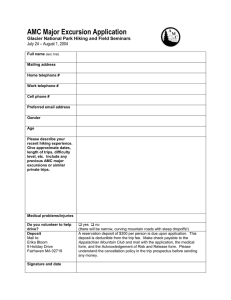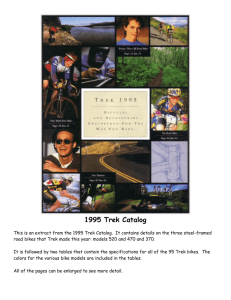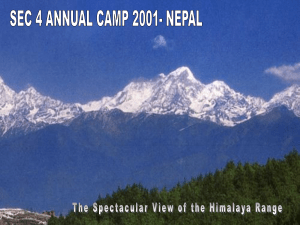Morocco Trek and Sights AMC Major
advertisement
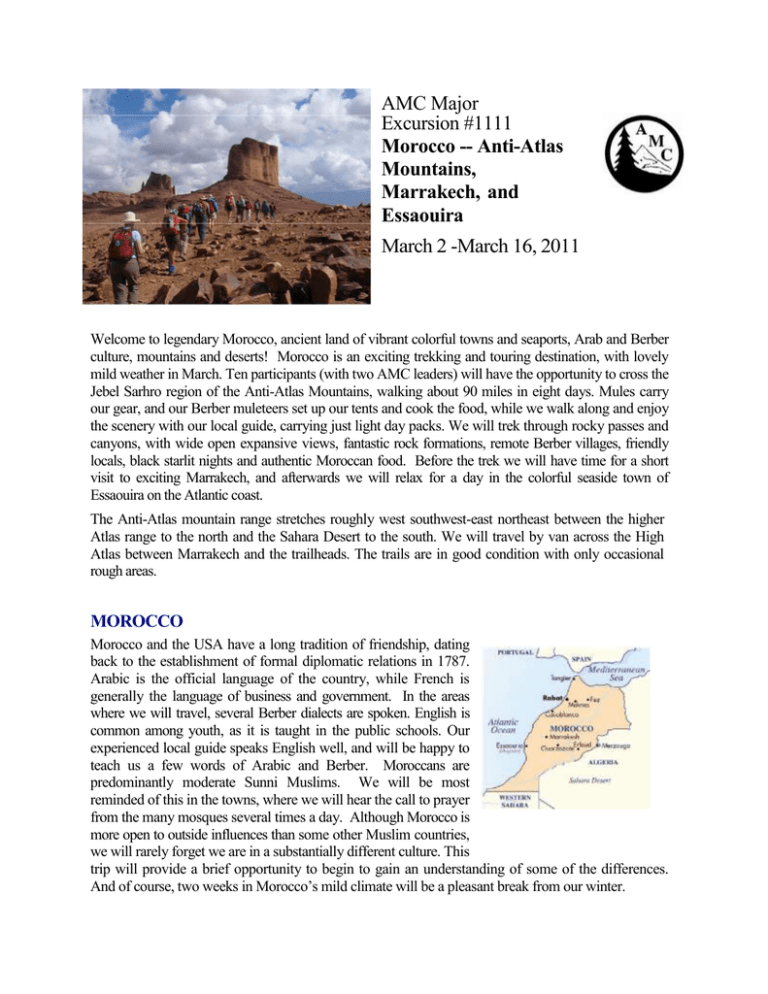
AMC Major Excursion #1111 Morocco -- Anti-Atlas Mountains, Marrakech, and Essaouira March 2 -MarchTrek 16, 2011 Morocco and Sights Welcome to legendary Morocco, ancient land of vibrant colorful towns and seaports, Arab and Berber culture, mountains and deserts! Morocco is an exciting trekking and touring destination, with lovely mild weather in March. Ten participants (with two AMC leaders) will have the opportunity to cross the Jebel Sarhro region of the Anti-Atlas Mountains, walking about 90 miles in eight days. Mules carry our gear, and our Berber muleteers set up our tents and cook the food, while we walk along and enjoy the scenery with our local guide, carrying just light day packs. We will trek through rocky passes and canyons, with wide open expansive views, fantastic rock formations, remote Berber villages, friendly locals, black starlit nights and authentic Moroccan food. Before the trek we will have time for a short visit to exciting Marrakech, and afterwards we will relax for a day in the colorful seaside town of Essaouira on the Atlantic coast. The Anti-Atlas mountain range stretches roughly west southwest-east northeast between the higher Atlas range to the north and the Sahara Desert to the south. We will travel by van across the High Atlas between Marrakech and the trailheads. The trails are in good condition with only occasional rough areas. MOROCCO Morocco and the USA have a long tradition of friendship, dating back to the establishment of formal diplomatic relations in 1787. Arabic is the official language of the country, while French is generally the language of business and government. In the areas where we will travel, several Berber dialects are spoken. English is common among youth, as it is taught in the public schools. Our experienced local guide speaks English well, and will be happy to teach us a few words of Arabic and Berber. Moroccans are predominantly moderate Sunni Muslims. We will be most reminded of this in the towns, where we will hear the call to prayer from the many mosques several times a day. Although Morocco is more open to outside influences than some other Muslim countries, we will rarely forget we are in a substantially different culture. This trip will provide a brief opportunity to begin to gain an understanding of some of the differences. And of course, two weeks in Morocco’s mild climate will be a pleasant break from our winter. ITINERARY . Day 1 - Depart the USA for the overnight flight to Morocco, via a connecting European city. Day 2 – Arrive in Marrakech, whose medina (old city) is a UNESCO World Heritage Site. After settling into our hotel we will have a little time to explore the nearby internationally famous bustling city square Djemaa el Fna, with fruit and nut stalls, magicians, traditional healers, and merchants of all sorts. You may also wish to wander through the adjacent souk, the largest traditional market in the country, marveling at the vast and colorful array of goods for sale. We will gather for a welcoming dinner, after which you may choose to go out for a cup of hot sweet mint tea back in the square, now magically transformed into a crowded warren of open air restaurants. Day 3 – After breakfast our van will take us across the High Atlas mountains, through Ouarzazate (famous for its movie sites) to the small town of Tansikht, near where we will meet our muleteers setting up our first night’s camp. Days 4 through 11 – For the next 8 days we will trek across the Djebel Sarhro, walking a total of approximately 90 miles (about 6 to 8 hours a day), stopping for fine picnic lunches, and camping at night in remote locations under dark starry skies amidst fascinating geological formations, or near verdant Berber settlements. We will ascend slowly, following stream beds (maybe with enough water for a dip), going up and down scrub covered hillsides, with occasional herds of sheep and goats grazing under the watchful eyes of young Berber herders, through small villages with almond groves and wheat fields wherever water is available, through Bab n Ali (the Gates of Ali), majestic eroded stone towers that can be seen from miles away, and perhaps for some, up to the granite summit of Kouaouch (8500 feet), with a little scrambling. Everywhere we will be surrounded by high ridges and gorges with fantastic rock shapes in all different earth tones, hardy vegetation, even occasional flowers, and maybe fossils, geodes or quartz crystals. On the last day we descend to the small town of Tagdilte, where we spend the night indoors (group accommodations) and expect to have hot showers available. Day 12 – Travel by van through the Dades Valley (also known as the Valley of the Roses, or of the 1000 Casbahs), and on to the Atlantic coastal town of Essaouira. Day 13 – All day to explore this very charming port town, whose medina is also a UNESCO World Heritage Site, with its picturesque fishing harbor and old fort, and where we can shop for local crafts. Day 14 – Half day in Essaouira, noon coach to Marrakech. Farewell dinner together. Day 15 – Depart Marrakech for the USA. AMC Morocco Trek March 2 – 16, 2011 2 of 9 EXPERIENCE AND RISKS In most senses this is not a difficult trip. We will be traveling at a relatively moderate pace over trails that generally have good footing, such as old roads and traditional hillside paths, with only occasional sections of uneven footing, such as boulders or rocky and sandy streambeds. The terrain is decidedly gentler than the high mountains of the Northeast U.S., with relatively little “exposure” (places where people who don’t like heights may feel uncomfortable). The altitude on our route will briefly get up over 7,000 feet, but there are only a few extended steep stretches. Mules will carry all our gear except our daypacks. However, there is no getting around the fact that we will be walking for 8 days straight, covering about 90 miles. That’s an average of 11 miles a day, in 6-8 hours, in a very dry and generally rocky environment, with little shade. The terrain often appears barren, sometimes with hours going by between any greenery or trees. That being said, it is surprisingly beautiful in its own stark way. And the sudden appearance of well tended orchards and wheat fields surrounding a small settlement is all the more refreshing and delightful! We will be sleeping in tents, on mats laid on the ground. At meals everyone will be sitting on the ground, on the same large mats. For more than a week, we will be away from civilization, and without some of our accustomed creature comforts, such as chairs and tables, running water and toilet facilities. The combination of remoteness, sustained physical exertion and dry air require that participants be in good physical condition and have a positive, flexible attitude. During the trek, we will pace ourselves according to the group’s needs, and pay close attention to adequate hydration and proper nutrition. Reliable drinking water and wholesome food will be provided on the trek, although variety may seem limited to those accustomed to a different menu every day. Vegetarian options will generally be available, but strict separation of vegetables from meat cannot always be guaranteed. Carrots, potatoes, squash and olives are typical vegetables in a Moroccan tajine-style dinner. On the trek we will be away from cities, towns, vehicles, paved roads, hospitals and doctors. Emergency and specialized medical care in Morocco are generally below U.S. standards, especially outside the major cities, and in the backcountry will not be immediately available at all. The leaders have some training in Wilderness First Aid and CPR and will carry a first aid kit, but they are not health care professionals. On the other hand, the mules supporting our expedition are available if someone is injured and needs evacuation to the nearest track passable for a 4-wheel drive vehicle. Our guide will have a cell phone, although it could take several hours to reach a point where there is sufficient coverage to get a signal and make arrangements for a 4-wheel drive vehicle to meet mules carrying an injured person to a point near a passable dirt track. From there, it may be further hours to a doctor and many more to a Western-style hospital. Helicopter evacuation may be possible, but we cannot count on it. AMC Morocco Trek March 2 – 16, 2011 3 of 9 In Marrakech and Essaouira, we may face overzealous salesmanship when we venture into the souk (market). At many commercial establishments, bargaining is not only accepted, but expected. Consider it all part of the cultural experience! Panhandling and pick pocketing are only minor concerns, and only in urban areas. However, you are encouraged to be careful and aware of your surroundings at all times. Traffic accidents may be a hazard in Morocco as road conditions are poor in some areas. As anywhere else, it is good to be alert wherever vehicles are present. We will be driven by professional drivers; we will not rent or drive any vehicles ourselves. Participants in this trip must be both physically and mentally prepared, and equipped with the appropriate gear. During the months preceding the trip, it will be important to practice regular fitness activities in preparation for hiking days of up to 12 miles, and for the rigors of camping. People who wish to participate in this trip must have previous hiking experience, at the intermediate level or higher. Although the hiking will be at a moderate pace, this is not a trip for a beginner, for someone who has not hiked in the last several years, for someone who has never hiked several consecutive days, or for someone who is not already in shape at the time we leave the U.S.. Prior to being accepted as a participant in this trip, you will be asked to discuss your capabilities and experience with us. Please do not be offended by our questions as they are the best tools we have to get to know you and your relevant experiences and abilities. Throughout the trip, you should always be aware of the risks involved and conduct yourself accordingly. We are not responsible for your safety: you are. WOMEN IN MOROCCO Moroccans are accustomed to people from Western cultures, but as visitors we should be respectful of local traditions and cultural norms. Moroccans tend to be conservative about gender roles and women’s clothing. It is best not to draw attention to yourself, and to make some effort to conform to the local cultural expectations for foreigners. Modest dress, loose clothing and covered shoulders are most appropriate. Tight or short pants and low-cut or sleeveless tops are not appropriate, are considered disrespectful, and may encourage unwanted attention. Loose shorts and short sleeved shirts are acceptable on the trails; bring a sarong or long, wide scarf to cover legs or arms when we interact with locals along the way. In the cities it is better to wear loose slacks or a long skirt and long sleeves. In Marrakech, we will occasionally see a Moroccan woman in heels and a dress much as you’d see in a U.S. city. On the other hand, while the beach in Essaouira is known for its beauty, it’s not for sunbathing or swimming. Especially in the cities, women should consider not walking alone; a coed group would be preferable. AMC Morocco Trek March 2 – 16, 2011 4 of 9 GROUP INFORMATION Group Size We will limit the group to ten participants and two leaders. We find that this size makes for a good balance between camaraderie and pragmatism. We will plan at least one pre-trip get-together so we can begin to get acquainted with each other here at home, although we realize that due to geographic locations and busy schedules, not everyone will be able to participate. Expectations Any extended trip requires cooperation between participants. We expect the group to work and play together as a team. While camp duties are almost eliminated by our having a support crew, it’s important that we be respectful of our crew and fulfills our obligations to them (for instance being neat with used dishes and utensils, and packing up our gear in a timely fashion in the morning). Additionally, participants are expected to offer the leaders and their fellow participants assistance when it’s needed. We will do everything possible to create a friendly atmosphere throughout the trip so that participants can focus on the scenery. We encourage each participant to let us know how the group dynamics are working for her or him throughout the trip. We have both led many fun, relaxed trips in the past and intend to make this trip another success. First and foremost, we aim to experience Morocco in a safe and fun atmosphere! ACCOMODATIONS We will stay in simple and inexpensive hotels. They are unlikely to resemble places you have stayed at in the U.S. We will spend our nights in Marrakech at a simple hotel that specializes in working with people like us who have come to do a trek. The location is conveniently close to the Djemaa el Fna, the central plaza and market in the old city. While on the trek, we will share 2 person backpacking tents. The crew will set them up before we arrive at each night’s campsite, and take them down in the morning. The crew will also erect two large square canvas tents with center and corner poles, one for our use for meals and hanging out and the other for food preparation, as well as a small toilet tent over a hole they have dug in the ground. In Essaouira, we will stay in a Moroccan-style guest house inside the old medina (town) AMC Morocco Trek March 2 – 16, 2011 5 of 9 COST The estimated cost for the trip is $1450. The price will cover the following items: -Accommodations for two nights in Marrakech, with breakfasts and dinners. -Fully supported trek including local guide, all meals, support crew and mules. -Tent accommodations on the trek. -Drinking water on the trek. -Accommodations for two nights in Essaouira, with breakfasts. -All ground transportation pre-arranged for the group, including vans between Marrakech and the trailheads, bus trip to Essaouira and back to Marrakech, and necessary airport transfers. -AMC Major Excursion overhead rate of 20% on all land arrangements. -Evacuation and repatriation insurance required by the AMC. You will need to purchase lunches in both cities, and dinners in Essaouira. You may also wish to purchase bottled drinking water during the city stays. You will have to purchase your own airline ticket, estimated to be approximately $900 - $1150. The leaders will be available to advise and assist you in planning your flight itinerary, but you will be the owner of your own ticket. Please be aware that, in accordance with AMC policy, you are subsidizing some of the leaders’ costs. Beyond this, in accordance with AMC rules, the leaders may not realize a profit from this excursion. The trip fee also includes an AMC overhead charge to cover the administrative expenses of offering Major Excursions. This charge is 20% of land costs; air travel costs are not included in calculating the overhead charge. After the trip, after all expenses have been paid, any trip funds in excess of the participant payments will be refunded to the participants. A refund of excess payments appears much more likely than any request for additional payment. WHAT’S NEXT If you have any questions, it will probably be quickest and easiest to ask us by email. Éva can be reached at borsody@gmail.com. You can reach Linda at lmoraski@peopleserveinc.com. If you prefer to arrange a time to discuss your questions by phone, just send us an email to let us know, and we will find a mutually convenient time to do so. Since we both travel a lot, this can sometimes take several days. Thanks for your patience! Please read the prospectus carefully to determine whether this is the kind of trip you would like to join. If so, let us know by email, and we will send you the application materials as an attachment to our reply email. AMC Morocco Trek March 2 – 16, 2011 6 of 9 The application materials consist of an Application form, a Confidential Health form, and an Acknowledgement and Assumption of Risk and Release form. Please complete all three forms, and sign and return them with a deposit check of $500, payable to the Appalachian Mountain Club, addressed to Éva Borsody Das, 59 Gosnold Street, Hull, MA 02045. Your check will not be deposited unless and until we offer you a place. If you are accepted from a waiting list, we will not deposit your check unless and until you confirm that you are still interested. We will acknowledge receipt of your application by email, and then arrange a time to talk with you about your experience, capabilities, and expectations, as well as to discuss any further questions you may have. We expect to notify participants of their acceptance before the end of October 2010. The final payment in the amount of $950 will be due on November 15, 2010. Please make checks payable to the Appalachian Mountain Club and mail to Éva Borsody Das, 59 Gosnold Street, Hull, MA 02045. When registration is complete, we will send all participants the names and contact information of those going on the trip. We will also start assisting you in planning your air travel. We will be using email as our primary source of communication. We will try to arrange a pre-trip gathering in the Boston area, perhaps including a hike, so that we can start getting acquainted before we head to Morocco. CANCELLATION Our cancellation policy is based on the simple precept that your cancellation shall not raise the cost to any of the other participants or the leaders. Therefore, if you cancel we will try to fill your spot with another participant, and refund any fees that you have paid, less an administrative fee of $200. We will do our best to fill your spot, but please realize that the later you cancel, the harder that may be, which could significantly raise the actual costs of your cancellation. After final payments have been received, the cancellation fee will be $500, or actual costs, if higher. AMC Morocco Trek March 2 – 16, 2011 7 of 9 TRIP LEADERS Leader Éva Borsody Das borsody@gmail.com 781-925-9733 Éva is an all season mountain hike leader for the Southeastern Massachusetts Chapter of AMC. Previously, she was a Delaware Valley Chapter hike leader while living in Philadelphia. As a hike leader for AMC’s August Camp since 1998, Éva has led groups all over the US, and serves on the August Camp Committee. She is a 2001 graduate of the AMC Mountain Leadership School, and is Wilderness First Aid certified. Éva was the co-leader of an AMC Major Excursion hiking trip to Romania in June 2007, and the leader of Major Excursions to Glacier National Park and the mountains of Bulgaria during the summer of 2009. Éva’s other trips include climbing Mt. Kilimanjaro in January 2008, climbing Mt. Rainier, and hiking in Newfoundland, the Alps, Pyrenees, Dolomites, the Picos de Europe in northern Spain, the Tatra Mountains in Slovakia and Poland, Patagonia, Ireland, Scotland and a similar trek to this one in Morocco, in March 2009. Éva is originally from Hungary, and loves to travel all over the world. Co-Leader Linda Moraski lmoraski@peopleserveinc.com 617-448-8895 Linda has lead/co-lead trips to Bhutan, France, Southeast Asia and Eastern Europe. She is an avid hiker and world traveler. Linda loves the outdoors and when she is not hiking, you can find her biking, kayaking, running or XC skiing. She has been to the summit of Mt. Kilimanjaro, ridden her bicycle from Florida to Boston and completed 5 marathons. Linda is thankful for finding the AMC as this is where she learned to hike, ocean kayak, white water kayak, rock climb, wind surf (well, kind of) and best of all, lead wonderful adventures around the world! AMC Morocco Trek March 2 – 16, 2011 8 of 9 EQUIPMENT LIST Below is a list of the required gear for the trip. Weather may be hot during the day but can get cool in the evenings, even cold at night in the mountains. We recommend an assortment of shorts, long pants, short and long sleeve shirts, and fleece jackets and/or sweaters. No cotton clothes on the trek, please. Required and Essential Gear Recommended and Optional Gear soft pack or duffle big enough for your personal clothing and gear, and suitable for tying to the back of a mule! your sleeping bag need not fit inside this bag as it can be packed on the mule on its own. If this is also your international travel bag, wheels are useful when you have to carry it. small bag for any travel clothing and gear you do not need during the trek day pack large enough to carry 2 quarts/liters of water, sun hat, flashlight/headlamp, extra layers, rain jacket, personal first aid kit, etc. broken-in hiking boots (preferably above ankle) sandals and/or sneakers for towns and time off the trail rain and wind protection gear at least 2 quart/liter water bottles or equivalent hydration system long hiking pants and shorts – synthetic (zip off pants work well) at least 2-3 sets of hiking socks with liners synthetic hiking shirts such as Polypropylene, Coolmax, Bergelene fleece jacket gloves and warm hat (it will get cool at night) waterproof pack cover or garbage bags comfortable clothing for evenings and in town (discrete, i.e. shoulders covered, skirt, sarong) lightweight flashlight or headlamp with extra batteries toilet paper and extra ziplock bags to pack it out after use 30 degree sleeping bag (warmer if you get cold at night, or an additional liner) pack towel sunscreen sun hat or visor, bandana sunglasses liquid hand gel personal first aid kit with moleskin, personal meds, etc. (leaders will have group first aid kit) AMC Morocco Trek hiking poles whistle knife snacks (if you have particular favorites which may not be available in Morocco) pillowcase (to stuff clothes in) or small pillow long thermal underwear for colder nights in tents sleeping bag liner sleeping pad to supplement the foam mattress provided slippers to wear in the evenings on the trek – the ground is dry or rocky underfoot earplugs binoculars or spotting scope moisturizing eye drops medications such as Imodium for digestive problems (nobody in the trekking group got sick on previous trips) camera, batteries, recharger (no recharging during trek) adapter plug field guides field notebook and pencil (waterproof or in ziplock bag) March 2 – 16, 2011 9 of 9
